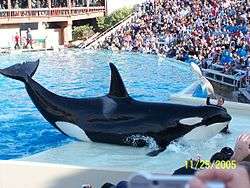Corky (killer whale)

Corky (II) is a female captive orca (or killer whale) from the A5 Pod in British Columbia, Canada. She currently lives at SeaWorld San Diego in California. Corky (II) received her name after the park's original Corky died in December 1970. She has been in captivity longer than any other killer whale.[1]
Origins
Corky was estimated to have been born in 1965. Her mother, designated A23, nicknamed 'Stripe', died in 2000. Around the age of four, Corky was captured in Pender Harbor off the coast of British Columbia on December 11, 1969.[1] Corky, along with a young unnamed male and a young female later named Patches, were sold to Marineland of the Pacific, in Palos Verdes, California. Of the animals captured on that day, only Corky still survives.
Life at Marineland
Corky was placed in a small pool with an adult male, Orky (II), also caught in the Harbor the year before her own capture. The two orcas remained together at the park for the next 17 years.
During her time at Marineland, Corky became the first orca to become pregnant and give birth in captivity. While pregnant with her first calf, no one was aware of her pregnancy. On February 28, 1977, the first calf to be born alive in captivity was born at Marineland to Corky and Orky. The calf was a male and died after eighteen days.
Corky went on to give birth six more times while at Marineland. Kiva, the longest surviving calf, lived only a total of 47 days. There are several theories as to why Corky's calves did not survive. The first might be that she was captured too young to have learned how to properly take care of a calf. However, even after she went through training to teach her how to nurse, the calves continued to die. Another reason the calves died so young could be attributed to the shape of Marineland's pools — small circles. Corky had to continually push her calves away from the walls and could not properly present her mammaries to the calves so that they could nurse. It was not until 1985 that a captive orca, Katina, gave birth to a calf that survived infancy (Kalina, who died in 2010.)
Corky's time at Marineland ended in January 1987, after the park was sold to SeaWorld. Corky, then pregnant for the seventh time, was moved with Orky to the park in San Diego. There, at SeaWorld, Corky suffered a miscarriage.
Life at SeaWorld
Corky and Orky were placed with the other orcas at SeaWorld, in a system of pools much larger than those they had lived in at Marineland. Orky was desired primarily for SeaWorld's new successful breeding program, and while at SeaWorld he sired two female calves, Orkid and Kayla, both of which are still alive today.
Corky, on the other hand, never became pregnant again. Three days after the birth of his first daughter, Orky died. When Orky died the trainers decided to name the calf Orkid, which stands for "Orky's Kid". Orky's daughter still resides at SeaWorld San Diego today.
In 1987, Orky II along with another female named Nootka were involved in an accident that injured trainer John Sillick. During a show for the public, Sillick was riding on Nootka's back when Orky received a signal to breach. Sillick's back, leg, and pelvis were broken when Orky landed on top of him; the accident was attributed to another trainer not realizing that Sillick was riding Nootka in the same area that Orky was instructed to breach. He was permanently disabled as a result of the attack, which may or may not be considered a case of orca aggression, or perhaps just a miscue on the part of trainers.
In 1989, the dominant orca at the park, Kandu V, attempted to rake Corky — a way orcas show dominance by forcefully scratching at another with their teeth. Kandu charged at Corky, attempting to rake her, but ruptured an artery in her own jaw. The people in the stadium were quickly ushered out, and after a 45-minute hemorrhage during which she swam alongside her calf Orkid, Kandu V died. Orkid, orphaned at only 11 months old, was placed with Corky, and the two remain together at the park to this day. Orkid and Corky were bonded for several years after the death of Kandu V.
Today, Corky lives with ten other orcas: Kasatka, Ulises, Orkid, Keet, Nakai, Ikaika, Kalia, Makani, Shouka and Amaya. Corky is one of the more gentle whales in captivity; when a trainer enters the water with a whale for the first time, the whale is primarily Corky. She has adopted and partially raised a number of whales since her move to SeaWorld: Orkid, of course, as well as Splash, Sumar (both now deceased) among others.
Corky is easily identified thanks to her tall, straight dorsal fin, her pointed eyepatches, and most distinguishing, her large size for a female. She also tends to swim upside down in the pools.
Corky today
Corky is now approximately 52 years old. She has lived in captivity for over 45 years. She suffers from cataracts in her right eye, though it does not seem to impair her daily activities. She still performs regularly in shows, under the stage name Shamu.
Further reading
- Ford, John K.B.; Ellis, Graeme M.; & Balcomb, Kenneth C. (2000). Killer Whales (2nd ed.). UBC Press. ISBN 0-7748-0800-4.
- Hoyt, Erich. (1990). Orca: The Whale Called Killer (3rd ed.). London: Robert Hale Limited. ISBN 0-920656-25-0.
- Morton, Alexandra. (2002). Listening to Whales: What the Orcas Have Taught Us New York: Ballantine Publishing Group. ISBN 0-345-43794-2.
- Patryla, Jim. (2005). A Photographic Journey Back To Marineland of the Pacific Lulu Publishing. ISBN 978-1-4116-7130-0.
References
- 1 2 "Corky's Story". Hal Sato. Retrieved January 29, 2016.
- ^ http://www.angelfire.com/gu/orcas/attack.html
- ^ http://www.pbs.org/wgbh/pages/frontline/shows/whales/debate/trainers.html